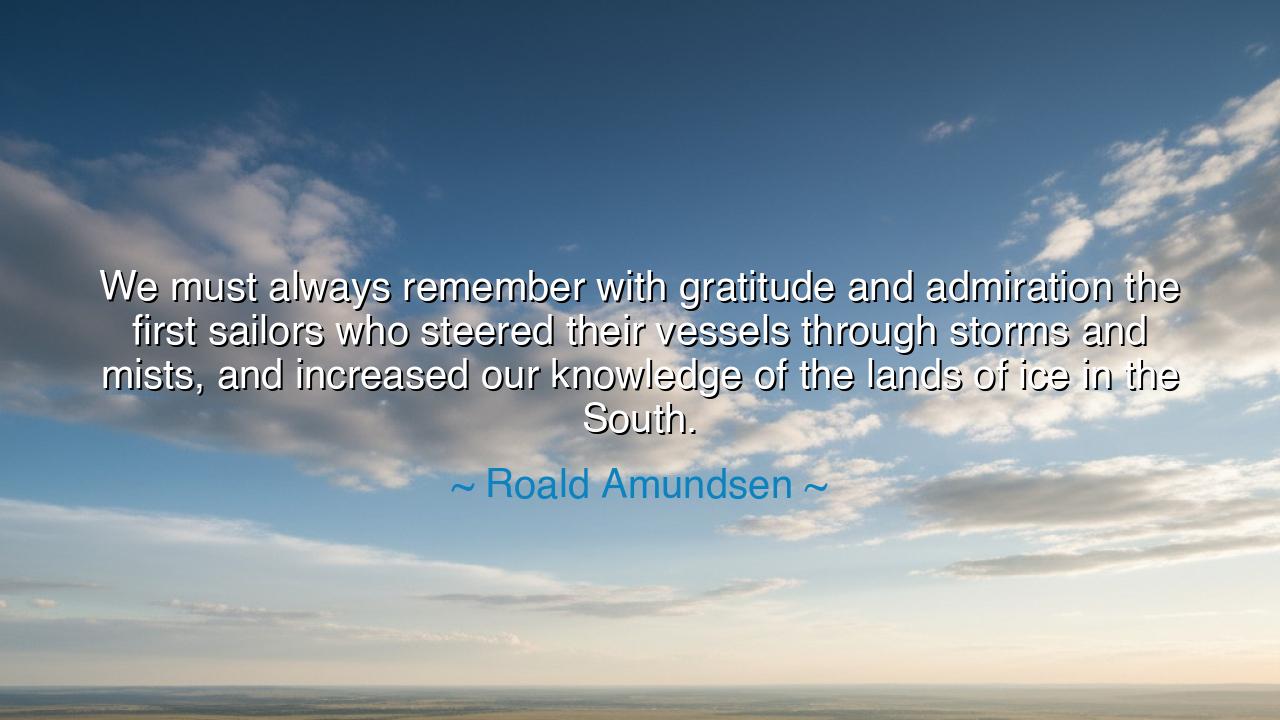
We must always remember with gratitude and admiration the first
We must always remember with gratitude and admiration the first sailors who steered their vessels through storms and mists, and increased our knowledge of the lands of ice in the South.






The words of Roald Amundsen, “We must always remember with gratitude and admiration the first sailors who steered their vessels through storms and mists, and increased our knowledge of the lands of ice in the South,” are not only an ode to explorers, but a hymn to the eternal courage of the human spirit. Spoken by the man who first set foot upon the South Pole, these words rise like a monument to all who dared before him — to those nameless mariners who faced the unknown when the world itself was still wrapped in mystery. In his voice, we hear reverence, humility, and awe — the recognition that discovery is never the work of one, but the echo of many who sailed before, guided by stars they could scarcely see.
To understand the origin of this quote, one must know the heart of Amundsen himself — a man of quiet strength and unbreakable resolve. Born in Norway, he grew up dreaming of the great white world that lay beyond the maps, the frozen realm that men of his time called Antarctica. But unlike others who sought fame, Amundsen sought knowledge and mastery. He was not the first to dream of the lands of ice, yet he was among the few who reached them — and in doing so, he honored those who had fallen short, who perished amid frost and storm so that others might one day succeed. His words remind us that progress is a chain of courage, forged link by link by souls who dared to step into the unknown.
In his tribute to the “first sailors,” Amundsen evokes the ancient tradition of gratitude — the awareness that every triumph rests upon unseen sacrifices. Long before he reached the pole, others had ventured into the southern seas, their ships swallowed by fog, their names lost to history. Men like James Cook, who first crossed the Antarctic Circle in 1773, or Ernest Shackleton, whose endurance in the face of disaster became legend. These men did not conquer nature — they conversed with it, suffered beneath it, and through their struggle, taught humanity humility. Amundsen, though victorious, bowed before their memory. He understood that the path to discovery is paved not with conquest, but with reverence.
In the spirit of the ancients, Amundsen’s words echo a deeper truth: that gratitude is the foundation of wisdom. Just as the philosopher honors his teacher and the warrior honors his ancestors, so must the explorer honor those who came before him. For the one who forgets the sacrifices of the past will soon lose his compass in the present. The storms and mists he speaks of are not only the gales of the southern seas, but the trials that every seeker must face — doubt, fear, failure, and solitude. The “vessels” are the fragile bodies and dreams we set afloat upon the vast ocean of life. And those who steer them through darkness, guided only by faith and courage, are the true architects of civilization.
Consider, for a moment, the story of Captain Cook, who braved the icy waters of the Antarctic in an age when the world believed such voyages were madness. His crew suffered frostbite, hunger, and despair, yet he pressed on, mapping lands and currents that others would later follow. A century later, Amundsen sailed those same waters — not to claim them as his own, but to fulfill the vision of those who had fallen short. This is the cycle of greatness: each generation building upon the bravery of the last, each dreamer lighting his torch from the dying embers of another’s fire. To remember them, as Amundsen commands, is to keep that fire alive.
His words also carry a moral beyond exploration — a lesson for every heart that seeks meaning. Knowledge does not grow in isolation; it is the harvest of countless hands, the fruit of sacrifices made in silence. Whether one studies the stars, builds nations, or nurtures children, each act of progress depends upon those who came before. To remember with gratitude is to acknowledge our place in the grand continuum of human effort — to see ourselves not as conquerors of the world, but as caretakers of its wisdom.
Let this, then, be the lesson: never forget the pioneers, in whatever field they walk. Remember the teachers who shaped you, the parents who endured for you, the ancestors who dreamed before you. When you achieve, give thanks. When you advance, look back. The greatness of a soul is not measured by how far it travels, but by how deeply it honors the journey of others. Gratitude transforms ambition into legacy, and remembrance turns victory into virtue.
For in the end, Amundsen’s words are not merely about the lands of ice, but about the warmth of the human heart — the eternal truth that every voyage of discovery is a thread in the tapestry of mankind. The storms may change, the mists may shift, but so long as we remember those who first dared to sail, we too shall find our way — through darkness, through uncertainty, toward the light of understanding that awaits beyond the horizon.






AAdministratorAdministrator
Welcome, honored guests. Please leave a comment, we will respond soon